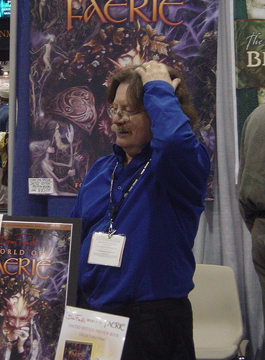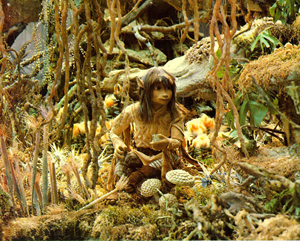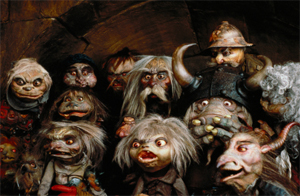|
Can't
See The Forest For The Faerie...
An Interview with Brian Froud
|
|
|
"They're
a direct response to how I feel about the world."
|
When
I was a wee lad - or wee high-school student anyway - one
name in fantasy artists stood above all others, mainly because
he had a sense of humor nobody else had. You knew the twisted
faeries and other fey creatures of Brian Froud in one glance.
A few years later, Froud joined his imagination to that
of another genius, Jim Henson. Together they created fantastic
worlds in the films Labyrinth and The Dark Crystal. Their
collaboration worked wonders, and though they'd intended
on more, Henson's untimely death cut that dream at the knees.
This week, both those films get a sumptuous re-release
on DVD, and to honor that, Froud took some time out of his
schedule at Comic-Con to sit down and talk about the films,
the collaboration, and a bit about his imagination.
Meeting Froud is like meeting a long-lost uncle you wished
you had somewhere in the family tree. Humble and charming,
he opened up easily in soft tones that could make you think
this guy has spent some time in other worlds and come back
for the better for it. He only grew wistful when speaking
of Henson; it's clear Froud still feels the loss of his
friend, but is proud of what they accomplished together.
Brian Froud:
Let's have a go with it.
Derek
McCaw: We'll start with the convention itself. You've
had some experience with it before, I'd assume…
Brian Froud:
Yeah, I've been coming here about five, six years or so.
But it keeps getting bigger and wilder. It's always interesting.
Derek
McCaw: We've got the DVDs coming out in mid-August…what
kind of involvement did you have now, coming back into this
after a couple of decades?
Brian Froud:
The interesting thing is that these movies are being constantly
re-released, on video and DVD. People just really respond
to them. It's fascinating to be doing another version of
it.
So they asked
me if I'd do a commentary on both of them. (laughs)
It's probably because there's nobody else around…just me,
surviving, surviving…
Derek
McCaw: How did it feel to go back and watch it?
Brian Froud:
In one sense it's a bit spooky. I'm always a person who
wants to go forwards, not backwards. However, I'm intensely
proud of these two movies that Jim Henson gave me the opportunity
to collaborate with him.
I know Jim himself
was really proud of these films.
|
|
|
"What's
under the carpet?"
|
However, to
review them is like a drowning man, seeing your past life
in front of you. But I had a great experience doing the
commentary. I was very nervous about doing it, but I went
to Peter Gabriel's recording studio in England.
It's in an old
mill. Beautiful place, he has a beautiful studio there.
They set up a little room for me. And it was very nice,
there was a nice comfy chair, and a nice carpet and a table
lamp, a nice bit of a folding screen and a television.
I thought this
is really quite lovely, but I felt that something was not
quite right. And I said, "what's under the carpet?"
They said, "well,
have a look." So I picked the carpet up and underneath was
a plate of glass, because it's right in the middle of the
mill. You could see the water rushing underneath, and I
thought, "oh, dear. I was hoping to be more stable and grounded
to do this."
But I took it
as a metaphor, that I have to re-engage with this. I sat
there. I was going to do both of them; I was going to stay
the night there, because I was really most worried about
being overcome with emotion, I think. Could I really deal
with it?
I'd had a word
with the sound man. It was just me and the films and the
sound man. I said, "I'm not sure I can do this, because
I was never there," and he looked at me horrified.
(chuckling)
I said "I don't mean it that way," in case he thought I
was some strange interloper. What I mean by that is that
it was rare that I was on the set. I was on the next set,
getting that ready. Or I was in the workshop getting the
puppets ready for Jim. I didn't see a lot of the actual
filming.
Whereas if Jim
were here, he could tell his stories about what was going
on on the set. So I thought, do I have anything to say?
I didn't know. And I sat there, and they just ran the film,
and I found that I'd talk. I just tried to talk about what
it felt like, what my emotions were, or what was going on
in the story…
Derek
McCaw: Did anything about watching these films surprise
you?
|
|
|
"...they
were the films we wanted to make..."
|
Brian Froud:
How fresh they are. How they don't date. I think that's
quite extraordinary. I think it's because we made both the
films -- Dark Crystal and Labyrinth -- they
were the films we wanted to make.
Although they
were in their time very high budget - extremely high budget
- they're not like modern films which seem to be driven
by accountants. These films were driven by Jim Henson's
passion for doing something like this. He gathered together
groups of people who were really creative. He loved creativity
and encouraged it. So we made the films we wanted to see
ourselves. Which oddly enough gives it its timeless quality.
It wasn't constrained by anything.
They grew organically.
They sort of subliminally contained a bit of every one of
us.
Dark Crystal
we started with nine people in a room in New York. When we
finished, we had three hundred and sixty people making it.
But it was a collaboration among all of us. Especially when
I was designing and working with people in the workshop, I
wanted their collaboration. I wanted their creativity to be
a part of it.
Derek
McCaw: Have you been able to recreate that feeling in
working with people since?
Brian Froud:
No. (laughs) But I haven't really been asked.
I think our
approach in the workshop was very open, and I remember a
couple of years ago talking to the WETA workshop people.
As they were describing how they work in their shop, it
sounded so familiar. And it was that very open quality that
Jim brought to these projects.
Derek
McCaw: Who do you think influenced you in your style
and your imagination? Who gave birth to Brian Froud?
Brian Froud:
Oh, I was a great fan of an English illustrator called Arthur
Rackham. He was turn of the century. He did a lot of fairy
tales. He was very influential in my work. He just somehow
captured the spirit of the land itself and trees and other
creatures.
Originally,
Disney wanted him to design the seven dwarfs and everything,
at least at one time. It's the landscape I live in that
influences me.
When Jim had
asked me to do the film, and he came to visit me where I
live in England, he said "I want some of this quality of
the landscape in the film." Whereas where I live it's very
green, we made it sort of brown, more of a desert, but it
still has that quality to it.
|
|
|
Yep. This
as far as my daughter made it when she was 2.
|
Derek
McCaw: Is there anyone now coming after you that you
admire, or you wish you could work with?
Brian Froud:
I don't know. I think there's so many people.
What's so interesting
about Dark Crystal is the number of people that come
up to me and say, because of it, they got into the movie
industry, or because of Dark Crystal, they took up
art. It's always a creative response to it. A lot of people,
it's just emotional. So many people responded in a creative
way, and Jim would have been delighted by that.
His legacy is
about creativity.
We were pioneering
so many techniques. It was a bit crude in the beginning,
with bicycle cables and bits of string and tape. Eventually
we moved more into animatronics and electronic stuff. I
was really proud that last year when the Academy of Arts
and Sciences showed Labyrinth as part of a big exhibition
on animatronics. That was the climax to the whole thing.
Not only haven't the films dated visually, but we were so
far ahead right there that it's been a long time since anybody
could catch up with it.
Especially in
Dark Crystal, there's an immediacy to what you see
on the screen. People have really struggled to capture that
(sensation) now. With the digital age, there's a danger
that digital stands in the way. Finally, that's beginning
to catch up. You need to get the emotion back into it, and
(digital) is beginning to do that now.
If Jim was still
alive, he would be doing that. He was a pioneer in technology.
He was always finding out about things. It's been wonderful
being part of history. When we did Dark Crystal,
it was a pure puppet film, but he would be doing anything,
anything that would come along, just to tell the story.
I'd love to be involved in something digital.
We've been trying;
we've been trying. We haven't quite managed to do it yet,
but we've been talking to a lot of people.
Derek
McCaw: Well, off and on over the years it's been rumored
that we'd see a Dark Crystal 2…
Brian Froud:
Yes. We've certainly been involved with a script and I've
been designing. We're hoping that it's going to go.
Derek
McCaw: What about books? A lot of us have been introduced
to your work through your art…are you working on any new
print projects?
Brian Froud:
I just finished one which is in one sense a retrospective
of my work, covering thirty years of me painting pictures
with some new stuff in it. It's a big book. There's all
sorts of little things going in it.
It's an exploration
of my art, but also gives you the emotion, the feeling of
what it is to experience the art. I take people on a journey,
not only in linear time back to when I first started up
til now, but it's also a journey of entering into the pictures
and into the thing that I do, and am most passionate about,
which is faeries.
Derek
McCaw: Why is that the thing that you're most passionate
about?
Brian Froud:
I think Rackham put me on the path. It's how I felt about
nature; I always thought it had some sort of spiritual content.
He drew faces in trees. So when I look at a landscape, I
know what it looks like on the outside. I want to know what
it looks like on the inside.
As soon as I
did that, then I started to draw trolls and faeries. They're
a direct response to how I feel about the world.
|








